Medical expert of the article
New publications
Preparations
Antipyretics
Last reviewed: 03.07.2025

All iLive content is medically reviewed or fact checked to ensure as much factual accuracy as possible.
We have strict sourcing guidelines and only link to reputable media sites, academic research institutions and, whenever possible, medically peer reviewed studies. Note that the numbers in parentheses ([1], [2], etc.) are clickable links to these studies.
If you feel that any of our content is inaccurate, out-of-date, or otherwise questionable, please select it and press Ctrl + Enter.
Today, there are a huge number of different antipyretic drugs on the market. We all know that at a low body temperature (up to 37.5 degrees), doctors do not recommend bringing it down, especially during the treatment of flu or colds. But there are cases when you simply cannot do without antipyretic drugs.
Indications antipyretics
Many of us take medications to reduce the temperature immediately after the unpleasant symptoms of a cold, flu or other ailment appear. But this is not entirely correct. If there is a need to reduce the body temperature in children, then the doctor may prescribe antipyretic drugs in the following cases:
- If body aches and headaches appear, and the baby’s temperature suddenly rises to 39 degrees.
- When febrile seizures occur and the temperature rises to 38 degrees.
- For the treatment of lung and heart diseases with a temperature increase of up to 38 degrees and above.
- If a baby suddenly develops a fever during the first three months of life.
For the treatment of adult patients, it is necessary to start taking such medications if the body temperature rises above 38.5 degrees, the body feels unwell, there is a headache, nausea or vomiting occurs.
 [ 6 ], [ 7 ], [ 8 ], [ 9 ], [ 10 ], [ 11 ]
[ 6 ], [ 7 ], [ 8 ], [ 9 ], [ 10 ], [ 11 ]
Antipyretic drugs for sore throat
Angina is an infectious disease, which often causes a rise in temperature. The temperature during angina can be subfebrile (not higher than 38 degrees) and febrile (from 38 to 39 degrees). Usually, already on the fourth or fifth day of the disease, the high temperature begins to subside.
First of all, it is important to remember that it is not recommended to bring down a subfebrile temperature during a sore throat. Doctors believe that the patient's body is fighting an infection in this way. But a febrile temperature needs to be brought down. At not too high rates (up to 38 degrees), paracetamol, analgin, and ibuprofen help. Medicines with these active ingredients should be in every family medicine cabinet. But aspirin, which is so often used to reduce body temperature, is prohibited during a sore throat. It can cause serious complications, especially in children (Reye's syndrome).
Next, we will look at several well-known antipyretic drugs for sore throat.
Grippostad. A medicine based on two active components: ascorbic acid and paracetamol. It is available in powder form. Paracetamol has an effective antipyretic and analgesic effect, and ascorbic acid helps to normalize oxidation-reduction processes.
The dosage of the drug is determined by the attending physician. It depends on the patient's condition, as well as his body weight and age. One dose (one sachet of powder) contains 600 mg of paracetamol. Usually one sachet is prescribed every six hours.
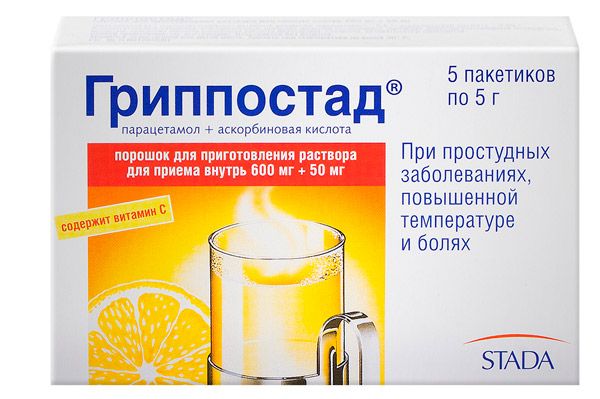
If the patient has been diagnosed with phenylketonuria, portal hypertension, glucose deficiency, acute or chronic kidney and liver diseases, leukopenia, thrombocytopenia, anemia, taking Grippostad is prohibited. It should be taken with caution together with other drugs that contain paracetamol.
Taking this medication may cause allergic reactions, epigastric pain, nausea, thrombocytopenia, anemia, and agranulocytosis.
Nurofen. A medicine based on the active component ibuprofen. It has an antipyretic, analgesic, anti-inflammatory effect.
If the patient has been diagnosed with acute or chronic gastritis, gastric ulcer and/or duodenal ulcer, Nurofen tablets should be taken during meals. It is recommended to take no more than one tablet three to four times in 24 hours. Drink the drug with a sufficient amount of liquid, preferably milk. Do not exceed the maximum daily dose of 6 tablets.
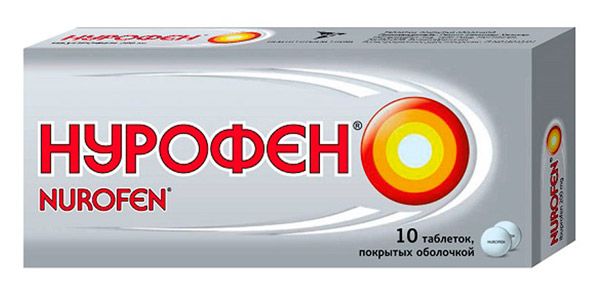
If the patient has been diagnosed with an allergy to ibuprofen, bronchial asthma, gastric ulcer and duodenal ulcer, gastrointestinal bleeding, heart disease, liver and kidney dysfunction, hemophilia, fructose intolerance, it is prohibited to use Nurofen. Do not take it if you are pregnant or have children under six years of age.
Please note that taking Nurofen with acetylsalicylic acid and other non-steroidal anti-inflammatory drugs is prohibited. Take tablets with thrombolytic agents and anticoagulants with caution.
Taking this drug may cause gastrointestinal bleeding, allergies, agranulocytosis, jaundice, nausea, diarrhea, colitis, liver failure, peptic ulcer, bronchial ulcer, allergic rhinitis.
Analgin. An analgesic, a derivative of pyrazolone. It has antipyretic, analgesic, and anti-inflammatory effects.
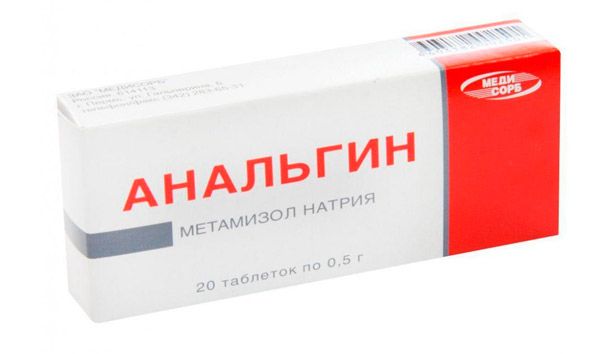
The dosage of Analgin is as follows: no more than 500 mg of the drug is divided into two or three doses in 24 hours. The daily dose cannot exceed 3 g of the drug. For the treatment of children, the dosage is determined according to the patient's age and body weight.
If the patient has been diagnosed with analgin intolerance, acute or chronic liver or kidney pathologies, blood diseases, glucose deficiency, taking the drug is prohibited. Analgin tablets can cause the development of allergies, skin rashes, agranulocytosis, leukopenia, Quincke's edema.
 [ 12 ], [ 13 ], [ 14 ], [ 15 ], [ 16 ]
[ 12 ], [ 13 ], [ 14 ], [ 15 ], [ 16 ]
Antipyretic drugs for poisoning
When poisoned, the body temperature often rises. In this way, the body tries to get rid of the toxins that have entered it faster. High temperature helps speed up metabolism, improve blood circulation and microcirculation of blood in organs, and speed up the process of removing toxins.
If the body temperature does not rise above 38 degrees during poisoning, then experts do not recommend bringing it down. When it begins to increase, a variety of antipyretic drugs will come to the rescue. But it is very important to calculate their dose correctly, since it is not worth burdening the liver at a time when the body is trying to remove toxins.
Release form
Antipyretics are available in a variety of forms. The most common among adults are various powders for suspension, as well as tablets. In some cases, if the general condition is severe, injections may be used.
For the treatment of children the following are most often used: syrup, suppositories, tablets.
Antipyretic drugs in injections
Of course, the most well-known forms of antipyretic drugs are powders and tablets. But there are cases when such drugs cannot cope with a huge number of various bacteria. Then the injection method of drug administration comes to the rescue.
Let's look at some of them.
Troychatka. An injection of this medicine helps not only to cope with high temperature, but also to significantly improve the patient's condition. As the name suggests, such an injection necessarily contains three special components. All of them effectively perform their work, enhancing each other's action.
As a rule, such an injection consists of analgin, papaverine and no-shpa (diphenhydramine). Usually the injection is given into the muscle. The triad may also consist of other active components, depending on how the disease is progressing and how the person feels. For example, diphenhydramine can be replaced with suprastin, and analgin - with any other painkiller.
Remember that Troichatka is used only in cases of severe illness. It helps to reduce fever, overcome allergies, and relieve pain at the same time.
Before using Troychatka, all ampoules should be warmed up a little in your hands, and analgin, papaverine and, at the very end, diphenhydramine should be drawn into the syringe. The medicine should be administered slowly.
Analgin. Analgin in the form of an injection is used quite rarely, since most people still prefer its tablet form. Analgin is injected into the muscle quite slowly. This drug helps to quickly get rid of fever.
The maximum daily dose of analgin in the form of an injection does not exceed 2 g of the drug. However, such injections are prohibited in some cases: if the patient does not tolerate this component, during pregnancy and lactation, with poor hematopoiesis.
Names of antipyretic drugs
Today in pharmacies you can find a huge number of various antipyretic drugs that can be used for various diseases. The most popular among them are the following:
- Paracetamol.
- Grippostad.
- Analgin.
- Ibuprofen.
- Nurofen.
- Aspirin.
- Dicrofenac.
- Indomethacin.
- Theraflu.
- Butadion.
- Nimesil.
- Metindol.
- Nise.
Paracetamol
Paracetamol has been used by mankind to reduce temperature for over a hundred years. It is one of the most well-known and safe non-steroidal anti-inflammatory drugs. This substance has low anti-inflammatory activity, since it has almost no effect on COX. Due to this fact, paracetamol has almost no side effects, does not irritate the stomach and does not disrupt water-mineral metabolism.
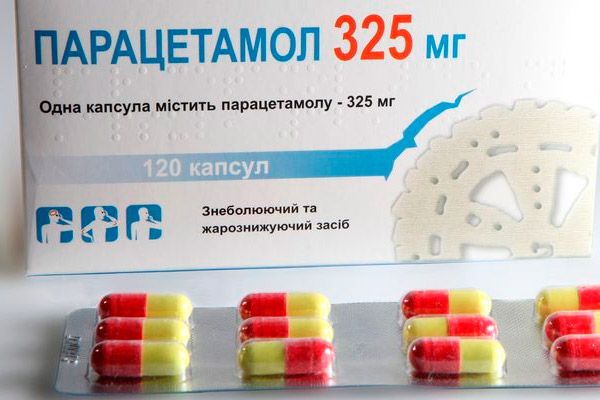
At the same time, paracetamol has a strong effect on the COX produced in the brain. Therefore, the drug has an antipyretic and analgesic effect. It is quickly absorbed from the stomach, so it begins to act within half an hour after taking it.
It should be noted that paracetamol is used to reduce temperature mainly in viral infections. If you notice that your body temperature does not drop after taking this medicine, you should immediately seek help from your local therapist.
Paracetamol can be found today in many tablets and powders for suspension. The most popular products with this active ingredient are:
- Adol.
- Grippostad.
- Dynafed.
- Daleron.
- Tylenol (including children's form).
- Medipyrine.
- Napa.
- Lekadol.
- Panadol.
- Paramol.
- Febricet.
Classification of antipyretic drugs
All antipyretic drugs can be divided into two large groups:
- Analgesics-antipyretics - have an analgesic and antipyretic effect. Such drugs can be used only if the body temperature has risen to 39 degrees, and also if other drugs do not give a positive result. Analgesics-antipyretics are currently prohibited in many countries of the world, because they can cause agranulocytosis. The most common drugs in this group are: Baralgin, Analgin Ultra, Propifenazole, Paracetamol, Sedalgin.
- Non-steroidal anti-inflammatory drugs – these medications inhibit cyclooxygenase, which is involved in the production of bradykinins, prostaglandins. Such drugs also help reduce sensitivity to the action of the above substances. The most famous drugs in this group are: Ibuprofen, Acetylsalicylic acid, Meloxicam, Nimesulide. Doctors recommend taking these drugs with caution in case of bronchial asthma and stomach diseases.
Antiviral antipyretic drugs
Doctors recommend taking Paracetamol and other medications with this active ingredient to relieve high fever during viral diseases. It is worth noting that these medications should only be taken if the temperature has risen significantly. It is not recommended to take the tablets as described in the instructions (four times a day) if the temperature remains normal.
Aspirin is contraindicated for the treatment of viral infections, especially for reducing fever in children. This can lead to severe disruptions in the functioning of the central nervous system, liver, and kidneys. Aspirin is also prohibited for stomach diseases.
 [ 29 ], [ 30 ], [ 31 ], [ 32 ], [ 33 ]
[ 29 ], [ 30 ], [ 31 ], [ 32 ], [ 33 ]
Antipyretic anti-inflammatory drugs
Antipyretic anti-inflammatory drugs usually contain the following active ingredients: sodium diclofenac, acetylsalicylic acid, metamizole, paracetamol, phenylbutazone, indomycin, ibuprofen, piroxicam, naproxen.
The main advantage of this group of medical preparations is the fact that they do not affect heat production in the human body in any way. They expand the capillaries in the skin, which increases sweating and dramatically increases heat transfer.
All these tools can be divided into several separate groups:
- Medicines with analgesic action, but poorly expressed anti-inflammatory effect. These include: Analgin, Paracetamol, Baralgin, Phenacetin.
- Medicines with moderate anti-inflammatory effect: Brufen, Acetylsalicylic acid, Surgam.
- Medicines with a strong anti-inflammatory effect: Piroxicam, Indomethacin.
 [ 34 ], [ 35 ], [ 36 ], [ 37 ], [ 38 ], [ 39 ]
[ 34 ], [ 35 ], [ 36 ], [ 37 ], [ 38 ], [ 39 ]
Antipyretic and analgesic drugs
The most common drugs that not only reduce body temperature in various infectious diseases, but also reduce pain, are the following.
Amidopyrine. A medicine based on the active component amidopyrine. It has analgesic, antipyretic, anti-inflammatory effects.
It is recommended to take these tablets three to four times per 24 hours in a dosage of no more than 0.3 g of the drug at a time. For children, the dosage should be reduced to 0.15 g per dose. Taking this drug can cause allergies and suppression of hematopoiesis.
Panadol. A medicine based on the active ingredient paracetamol. It has an antipyretic and analgesic effect.
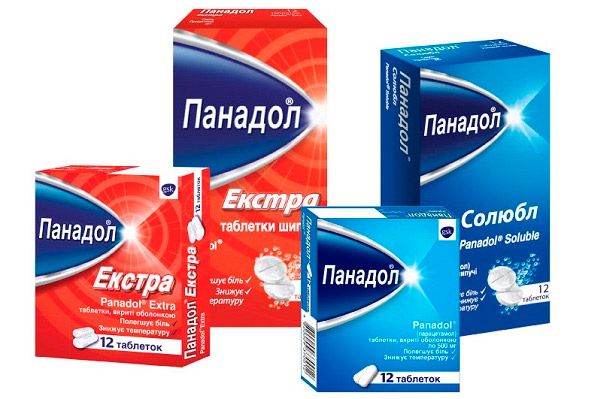
The recommended single dose for adult patients is two Panadol tablets. You can take it up to four times in 24 hours. Please note that you can only take four doses per day. For children, the single dose is one or two tablets. For the treatment of infants, a suspension or syrup can be used.
Taking Panadol may cause skin rash, allergies, and abdominal pain.
Efferalgan. A drug based on paracetamol. Available in the form of a solution and effervescent tablets. It has an analgesic and antipyretic effect.
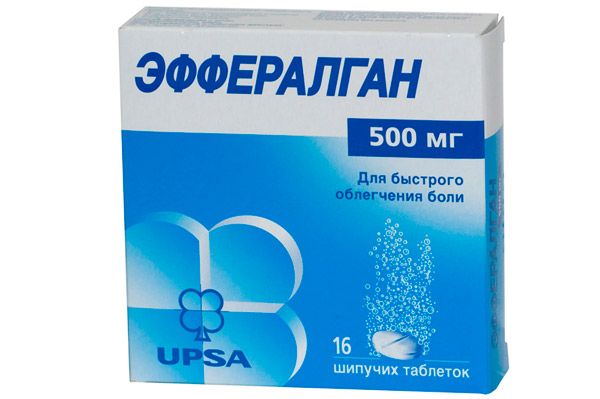
When using effervescent tablets, one of them must be dissolved in one glass of water. It can be taken up to three times in 24 hours. For small children, a solution can be used.
If the patient has been diagnosed with acute or chronic liver and kidney pathologies, taking the tablets is prohibited. Taking them can cause various allergic reactions.
 [ 40 ], [ 41 ], [ 42 ], [ 43 ]
[ 40 ], [ 41 ], [ 42 ], [ 43 ]
Antipyretic drugs for children
First of all, when choosing medicines for children that reduce body temperature, it is necessary to pay attention to their form of release. Here everything depends on the age of the child. For small patients, the most suitable drugs are in the form of:
- Syrup or liquid mixture - they start to act quite quickly, a convenient way to take.
- Suppositories – are quite effective and start working quickly (from forty minutes after taking). This form is suitable if the child starts vomiting and cannot take a pill or syrup.
- Chewable tablets - please note that they are not suitable for everyone, as they often cause allergies.
Remember that any antipyretic drug can only be given after consulting a pediatrician. It is also necessary to select the correct dosage according to the instructions. Such drugs can be re-used only four hours after the previous dose.
The following antipyretic drugs are used in modern pediatrics:
- Ibuprofen (Nurofen, Ibufen).
- Paracetamol (Panadol, Tylenol, Eferalgan).
- Viburcol (homeopathic medicine).
Pharmacodynamics
Let us consider the pharmacodynamics and pharmacokinetics of antipyretic drugs using the example of the drug "Panadol".
It is an analgesic-antipyretic, which has an antipyretic effect. By blocking COX only in the central nervous system, Panadol affects thermoregulation processes and pain centers.
Pharmacokinetics
Due to the high absorption of paracetamol, which is part of Panadol, the maximum concentration of the drug is achieved after 2 hours. It should be noted that 1% of paracetamol penetrates into breast milk. The drug is metabolized in the liver (up to 95%). It is excreted through the kidneys.
Use antipyretics during pregnancy
Pregnant women have a greatly reduced immunity, so they are more likely to suffer from colds and infectious diseases, which are accompanied by an increase in temperature. First of all, it is worth remembering that Aspirin is completely contraindicated during pregnancy and lactation, since this drug blocks prostaglandin, and this causes bleeding, which can be dangerous for the health of the expectant mother and baby.
In the first and second trimesters, Ibuprofen and Paracetamol can be taken to reduce high body temperature, but only after the recommendation of the attending physician. But starting from the third trimester, Ibuprofen is strictly prohibited.
Shelf life
The shelf life of such medical products is up to five years.
 [ 72 ]
[ 72 ]
Attention!
To simplify the perception of information, this instruction for use of the drug "Antipyretics" translated and presented in a special form on the basis of the official instructions for medical use of the drug. Before use read the annotation that came directly to medicines.
Description provided for informational purposes and is not a guide to self-healing. The need for this drug, the purpose of the treatment regimen, methods and dose of the drug is determined solely by the attending physician. Self-medication is dangerous for your health.

